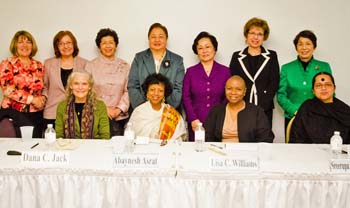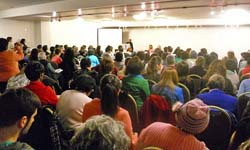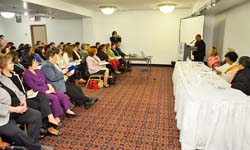CSW57 Parallel Event 2013
Women Standing Up to Violence: Finding Ways Through with Hope and Connections
MELISSA GONTIJO
MARCH 4, 2013 - ARMENIAN CONVENTION CENTER, NEW YORK
CSW57: WFWPI Parallel Event
Speakers:
Lisa Carol Williams, Founder & President, Circle of Friends and Living Water for Girls, USA
Abaynesh Asrat, Founder, President & CEO, Nation to Nation Networking, Ethiopia
Dana C. Jack, Professor, Western Washington University, Advisor to Justice for All, Nepal
Sreerupa Mitra Chaudhury, Chairperson of the Nat'l Institute for Gender Justice, India
Moderator: Bonnie Berry, UN Representative, WFWP International
The Armenian Convention Center in New York attracted fresh faces in anticipation of inspiring talks from four expert panelists. The event served as a forum for the panelists to share stories, enlighten us and describe the seriousness of violence against women. The room was full with 200 participants.
As the panelists each spoke from the podium, audience members listened to the harsh statistics on violence against women. Personal connections to violence, visual presentations, passionate step by step suggestions for change, and all the issues at hand in various parts of the world were communicated to emphasize the themes connection and hope.
Introducing the first guest speaker Lisa Williams to the stage, Bonnie Berry, explained Mrs. Williams' tremendous achievements warmly. Through her organization, Living Water for Girls, she is working with young women and girls who have survived violence, human sex trafficking and prostitution, giving so many girls a voice and hope. After citing the UN's definition of violence against women, she listed several statistics to emphasize the growing threats against women. Mrs. Williams confidently believes that the scope of the problem in fact indicates a war against women.
While trying to find solutions to combat sex trafficking against women, she reminds the audience that it is a crime to rape and use women for a profit. A shift needs to take place regarding the roles placed on women. They cannot be thought of as the weaker sex, an object of sex, or as invisible and expendable. Mrs. Williams suggests communities need to be more involved against such violence. Religious organizations can help to reduce and end such violence through onsite prevention and education to members. Protocols should be placed throughout the community to act against and prevent violence. Educating young girls through the schools would empower them to understand their value and become aware of the risks of trafficking and other violence that exist. She ended with emphasis on hope, encouraging us that our passion can change the world.
Abaynesh Asrat, excited to share her efforts through her nonprofit, Nation to Nation Networking Ltd., described hope as the backbone of life and humanity. Focusing on Ethiopia and its struggles, including high rates of maternal mortality and women marrying young, she struck at the big question: what can we do? The organization has helped provided counseling, raised funds to build a fistula satellite hospital in which 90% of fistula cases are cured, and continue to empower women to live confidently. These women who receive medical care now have hope for their futures instead of facing marginalization without the medical care. They also meet other women at these hospitals and find lasting support through women to women networking.
Ms. Asrat also encouraged the midwifery college which is now graduating its second group of women. Initial concerns of men coming from surrounding communities to rape incited the recruitment of guards to keep the women safe. Trafficking, driven by money and power, is also a growing problem in Ethiopia. Traffickers need to be identified because this is a multibillion dollar criminal enterprise. Justice needs to be served. Her last point reflects on the powerful messages created with art. By writing or creating art, she feels that hope can be reborn.
Inspired by the actions made on behalf of women's rights, Dana Jack, a Professor at Western Washington University and advisor to the NGO Justice for All in Nepal, is connected to the NGO because it brings a voice to the victims of violence. This NGO is the first of its kind in Nepal, formed by seven women lawyers, who are dedicated to women's rights. One of the main problems in the patriarchal society of Nepal is that laws to protect women against violence are not enforced. Violence against women can make them feel silenced and depressed, which can also be another form of violence. Justice for All takes perpetrators to court and through the legal system.
Women turn to other women during rough times and common violent threads silence their voice. They share and talk to find hope. Stress can be reduced, according to research, when women have a voice. Providing statistics, Dr. Jack pointed out that approximately 81% of women face domestic violence in rural areas in Nepal. Suicide is now the leading cause of death among young Nepalese women because of various forms of violence and depression. Justice for All has made great strides, winning seven out of ten cases against perpetrators. They are making it possible for young girls to make a new life. They are even educating men to speak out against domestic violence.
Wearing a hand woven sari crafted by rape survivors, Ms. Sreerupa Chaudhury, president of the Women's Federation of World Peace India and Chairperson of the National Institute for Gender Justice, first introduced the news story of a brutal rape of a 16 year old paramedical student in New Delhi on the 16th of December, 2012.She explained nationwide challenges including violence against women in armed conflict in border disputes. She emphasized some of the main issues of violence against women, especially in relation to organ trading. Concern about sex trafficking is being eclipsed by the growing market for organ trading. Mafia groups come from outside India to train thugs in India how to drug and capture women to steal (forced surgery) organs to sell.
Ms. Chaudhury has personally interviewed jailed rapists in attempt to understand why men rape women. Each man she interviewed had been abused as a child. She believes that in order for change to occur, family education is needed. Women must be allowed to take leadership roles in influential positions such as parliament. At the grassroots level there have been successful elections increasing participation of women leaders. India has created rehabilitation centers for women survivors of violence to heal and also empower women in India. In finishing, she stressed the importance of maintaining that heart to heart connection to support all women.
Questions following the four panelists from the audience brought up the role of informal education as well as what women can do to foster their own inner confidence and beauty. Panelists reminded the audience that the roles placed on women by the media needs to shift. Young girls need to hear from their mothers that they are loved and are intelligent. This informal motivation and education can foster inner confidence in young girls.







